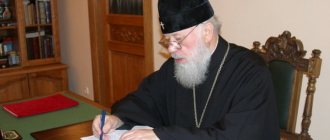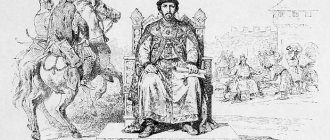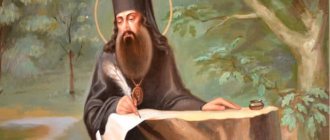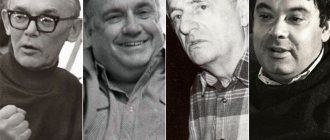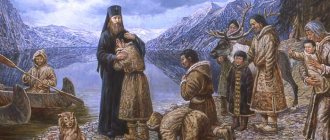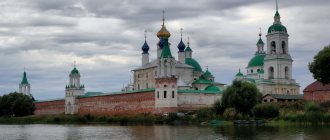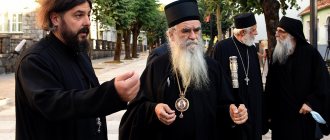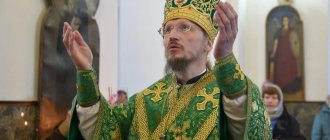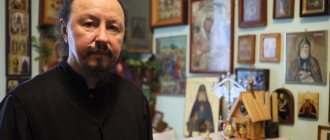| Metropolitan Tikhon (Shevkunov) |
Tikhon (Shevkunov)
(born 1958), Metropolitan of Pskov and Porkhov, head of the Pskov Metropolis, executive secretary of the Patriarchal Council for Culture of the Russian Orthodox Church, member of the Supreme Church Council of the Russian Orthodox Church, member of the presidium of the Inter-Council Presence of the Russian Orthodox Church, acting rector of the Pskov-Pechersk Theological Seminary, Holy Archimandrite and Abbot of the Assumption Pskov-Pechersky Monastery in Pechora and Holy Archimandrite of the Annunciation Nikandrovsky Monastery in the village. Lyubovets, Dubrovensky volost, Porkhov district, Pskov region In the world, Georgy Alexandrovich Shevkunov, was born on July 2, 1958 in Moscow into a family of doctors.
In 1982 he graduated from the screenwriting department of the All-Union State Institute of Cinematography with a degree in literary work.
After graduating from the institute in 1982, he received St. baptism and immediately after that he arrived at the Pskov-Pechersky Monastery, whose monks, and first of all the confessor of the monastery, Archimandrite. John (Krestyankin), had a decisive influence on his life. Novice.
Since August 1986, he worked freelance (in the status of a novice of the Pskov-Pechersk Monastery) in the Publishing Department of the Moscow Patriarchate, headed by Metropolitan Pitirim of Volokolamsk and Yuryev.
On July 2, 1991, he was tonsured a monk at the Donskoy Monastery with the name Tikhon in honor of St. Tikhon, Patriarch of Moscow and All Russia. In July of the same year he was ordained a hierodeacon, in August - a hieromonk; served in the Donskoy Monastery in Moscow.
In 1993, he was appointed rector of the Moscow metochion of the Pskov-Pechersky Monastery, into which the parish of the Vladmir Cathedral of the former Sretensky Monastery was transformed. He performed his first service in the cathedral on the feast of the Presentation of the Lord in 1994, together with the “Sretenie” brotherhood, which arbitrarily continued to occupy the cathedral.
On June 6, 1995, he was appointed abbot of the Moscow Sretensky Monastery and elevated to the rank of abbot.
| Archim. Tikhon (Shevkunov). Photo by M. Rodionov |
On September 8, 1998, he was elevated to the rank of archimandrite by Patriarch Alexy II of Moscow and All Rus' in the Moscow Sretensky Monastery.
Since 1999 - Academician of the Russian Academy of Natural Sciences.
Since March 2001, he has been the chairman of the agricultural production cooperative “Resurrection” in the Mikhailovsky district of the Ryazan region (a former ruined collective farm, being restored by the monastery).
On July 17, 2001, he was appointed rector of the Sretensky Higher Orthodox Monastic School, which was transformed into the Sretensky Theological Seminary on December 26, 2002.
Author of the film “Pskov-Pechersk Monastery”, which received the Grand Prix at the XII International Festival of Orthodox Film and Television Programs “Radonezh” (Yaroslavl) in November 2007. Author of the film “The Death of an Empire,” shown on January 30, 2008 on the Rossiya channel. Byzantine lesson."
On July 27, 2009, he became a member of the presidium of the Inter-Council Presence of the Russian Orthodox Church.
Since January 29, 2010 - member of the Commission of the Inter-Council Presence on issues of worship and church art, member of the Commission of the Inter-Council Presence on the organization of church missions (until October 23, 2014 [1]), member of the Commission of the Inter-Council Presence on issues of organizing the life of monasteries and monasticism, member commission on the organization of church social activities and charity (until December 16, 2010 [2]), member of the Inter-Council Presence commission on the information activities of the church and relations with the media (until December 16, 2010) [3].
On March 5, 2010, he was appointed executive secretary of the newly formed Patriarchal Council for Culture [4]. In the same year, he was appointed head of the Commission for Interaction of the Russian Orthodox Church with the museum community.
From December 16, 2010 to December 24, 2015 [5] - Secretary of the Commission of the Inter-Council Presence on Church Law [2].
On March 22, 2011, he became a member of the newly formed Supreme Church Council of the Russian Orthodox Church [6].
| Ep. Tikhon (Shevkunov) on the day of his consecration, October 24, 2015 |
On February 29, 2012, he was installed as abbot of the Sretensky Monastery with the presentation of the hegumen's staff in the cathedral church of the Sretensky stauropegial monastery in the city of Moscow by Patriarch Kirill of Moscow and All Rus' [7].
In 2012, he was appointed chairman of the parish council of the Churches of the Life-Giving Trinity and the Presentation of the Blessed Virgin Mary at the Saltykov Bridge in Moscow [8].
| Bishop Tikhon (Shevkunov) |
On October 22, 2015 he was elected [9], on October 23 he was named [10], and on October 24 of the same year he was consecrated Bishop of Yegoryevsk, vicar of the Moscow diocese.
The ordination in the cathedral in honor of the Kazan Icon of the Mother of God of the Kazan Ambrosian Hermitage in Shamordino was led by Patriarch Kirill of Moscow and All Rus'. Concelebrating with him were: Metropolitans of Volokolamsk Hilarion (Alfeev), Kaluga and Borovsk Clement (Kapalin), Saratov and Volsk Longin (Korchagin); Archbishops of Pesochensky and Yukhnovsky Maximilian (Lazarenko), Sergiev Posad Feognost (Guzikov); bishops of Solnechnogorsk Sergius (Chashin), Kozelsky and Lyudinovsky Nikita (Ananyev) [11]. On October 29, 2015, he was appointed manager of the Western Vicariate of Moscow.
On April 14, 2016, he was appointed rector of the Church of the Life-Giving Trinity at the Saltykov Bridge in Moscow with instructions to prepare the temple for the great consecration in 2022 in connection with the 200th anniversary [12].
On May 14, 2022, he was appointed ruling bishop of the Pskov diocese and head of the Pskov Metropolis, retaining his position as chairman of the Patriarchal Council for Culture [13].
On May 17 of the same year he was elevated to the rank of metropolitan by Patriarch Kirill of Moscow and All Rus' [14].
On May 19, 2022, he was relieved of his position as abbot of the Sretensky Monastery in Moscow and the position of rector of the Sretensky Theological Seminary [15].
On July 14, 2022, he was appointed sacred archimandrite and abbot of the Assumption Pskov-Pechersky Monastery in the city of Pechora and sacred archimandrite of the Annunciation Nikandrovsky Monastery in the village. Lyubovets, Dubrovensky volost, Porkhovsky district, Pskov region.
On June 17, 2022, he was appointed acting rector of the newly formed Pskov-Pechersk Theological Seminary.
Member of the Public Council under the Ministry of Culture of the Russian Federation (since July 2012). Author of many publications in the church and secular press.
Biography
The future monk was born into a family of Soviet intelligentsia in 1958. His mother was a doctor, a respected Soviet citizen, and the family was not a believer or a church member. Georgy Shevkunov (as the future monk was called in the world) grew up as a completely ordinary Soviet child, not showing any special spiritual talents or aspirations in childhood.
Metropolitan Tikhon Shevkunov
When the time came to choose a profession, the creative young man entered the famous VGIK, the faculty of scenography. It was student age that became a turning point for the spiritual state of the young man. He began to rebel against the gray Soviet foundations, to look for something more, to think about the meaning and purpose of human life.
Graduation from university was marked by another important event in George’s life - he received Holy Baptism. Immediately after this, the young man left as a novice for the Pskov-Pechersky Monastery, where by God’s Providence he was lucky enough to become the spiritual child of the famous elder John Krestyankin.
Of course, Father John’s acquaintance and spiritual guidance played a vital role in the development of Georgy Shevkunov’s faith. A person who grew up among the Soviet intelligentsia, received a prestigious worldly education, and even in the field of culture, had to overcome a lot within himself in order to take the path of following the Lord.
Interesting! Having the necessary skills in literary work, the novice is hired to work on the publishing council of the Moscow Patriarchate. His ability to write texts and work with words came in very handy here.
Immediately the future monk met Metropolitan Pitirim (Nechaev), who impressed the young man with his selfless work for the good of the Church. And so, having gone through some path of simple novitiate and worked for the Church, in 1991 Georgy Shevkunov was honored to be tonsured a monk.
Consecration of Archimandrite Tikhon as Bishop of Yegoryevsk
This significant event took place in the Donskoy Monastery in Moscow, which had just been restored. Georgy Shevkunov was tonsured under the name Tikhon, in honor of the holy Patriarch Tikhon. Soon, the ruling patriarch ordained him to higher monastic ranks - hierodeacon, and then hieromonk. He remained to serve in the same monastery.
He gained fame in Orthodox circles in 1993, when the holy incorruptible relics of Patriarch Tikhon were found in the Donskoy Monastery. 2 years after this event, he was appointed head of the metochion of the Pskov-Pechersky Monastery in Moscow.
Since churches and monasteries were actively restored in the first years after the collapse of the Union, the issue of personnel hierarchy was acute within the Church. And in 1995, Father Tikhon was appointed abbot of the Sretensky Monastery, where he would soon be elevated to the rank of archimandrite by Patriarch Alexy II.
On the basis of the monastery, the Sretensky Theological School appeared, which already in 2002 received the status of a theological academy. Father Tikhon works here as rector. Being already a famous person, Father Tikhon also meets the head of state, Vladimir Vladimirovich Putin.
Metropolitan Tikhon with Vladimir Putin and Patriarch Kirill
The archimandrite accompanies the president on his trip to the Pskov-Pechersky Monastery, and later during his visit to the USA. Ill-wishers shrouded this trip in a lot of gossip and rumors; Father Tikhon began to be called an agent of the president. Nevertheless, the archimandrite continued his work for the good of the Church.
In 2004, the future bishop graduated from Sretensky Theological Seminary as an external student, having officially received a document on theological education.
Actively participates in the movement to reunite the unity of the Russian Orthodox Church of the Moscow Patriarchate and the Orthodox Church of the West. It is through his works that today we have unity with many of our brothers in faith living abroad.
Important! In 2012, in the main church of the Sretensky Monastery, at a majestic bishop's service, Patriarch Kirill solemnly proclaimed Father Tikhon as abbot of the monastery and presented him with a special abbot's staff.
Father Tikhon is actively involved in many issues of internal church life. So, he becomes the secretary of the cultural council under the Patriarch, and is also a member of the supreme church council of the Russian Orthodox Church.
"Black International" and its war against the USSRPart I.
“The sleep of reason gives birth to monsters” (F. Goya) The main plot of the book concerns the “black international” not only as an ultra-right political movement, but also as an international institution of carefully disguised revanchism of past failures of fascist ideas. Today Russia is entering a turning point in its history. The country faces two fundamentally important tasks, on the solution of which the fate of our Fatherland for the coming decades depends. It is necessary to withstand the colossal foreign policy onslaught, which, contrary to the hopes of some short-sighted analysts, with the advent of the Donald Trump administration in 2022 not only did not weaken, but, on the contrary, radically intensified. At the same time, Russia must make a rapid economic, technological and, no less important, social leap forward - a vital leap into the future for the country, which will allow the country in the 21st century. take its rightful place among the leading states of the world. The fourth term of Vladimir Putin's presidency is key to responding to both of these challenges. There is a third, implicit, but equally serious problem - the political illiteracy of the population, which helps to easily implement the most unthinkable plans of the black international.
At a turning point in our history, a variety of groups within society and the political elite are actively promoting their “scenarios for the future.” Television broadcasts, bookstore shelves, academic journals and popular online publications are overflowing with analytics, journalism and propaganda devoted to one single question - where will Russia move, what historical choice should our country make.
Obviously, the President, who has already done a lot in almost two decades at the head of Russia, understands the severity of the situation. Now he has to steer the ship of Russian statehood into the future, navigating it between the Scylla of “liberal defeatism” and the Charybdis of “dense security”, not by chance mentioned in the inaugural speech. It is necessary to simultaneously ensure the continuity of the system and give dynamism to the country, to prepare new administrative and political personnel who will be able to preserve, continue and increase Putin’s foreign and domestic political achievements. It is unlikely that it will be possible to repeat the experiment with “tandemocracy”, which was relatively successfully carried out in 2008-2012. Neither the international situation nor the scale of the tasks facing the country contribute to this. Today we need to search for more complex, bold and effective solutions that can ensure long-term and crisis-free development of Russian society, the political system and the national economy. Of course, there are enough forces in the world who want to prevent this.
Some of them are well known to us, this is the so-called. “Orangeists” - the widest spectrum of pro-American radical “globalists”, separatists of all stripes and oppositionists, “liberals”, as well as a whole range of representatives of a similar kind - from “Navalny”, libertarians to pro-Ukrainian neo-Nazis. Thousands of revealing materials have been published about them, the biographies of all the leaders of these groups are well known, the connections of such “oppositionists” with foreign countries and foreign intelligence services are no secret to anyone. And they don’t hide too much. Therefore, to a large extent, the threat posed by such people has been neutralized: Russian society and authorities have been warned and have no illusions about these forces, which almost openly proclaim their hatred of the country and demand immediate capitulation to Washington.
But there are also more insidious opponents.
In 2014, the so-called “Crimean majority” is a broad association of political groups, public organizations and ordinary citizens of various political beliefs, united by a common idea of the need to actively resist the nationalist coup in Ukraine, as well as support the people of Crimea in their desire to return to Russia, despite aggressive opposition to this from the USA and part of European countries. This new political majority, whose recognized political leader was the current head of state, included, in addition to the moderate left, right and center, the so-called. “radical patriots”, who would be more correctly called “pseudo-patriots”. The basis of the black international has always been radical patriots and fanatics.
Being long-term critics of the West, preachers of the “special path of Russia” and adherents of the “strong hand”, in the years following the reunification with Crimea, they became part of the establishment: they occupied the main state information platforms, received full ownership of their own think tanks and institutes, and settled on financial flows , intended for civil society organizations, have flooded the educational sphere and even penetrated into government, occupying positions in public councils and advisory groups under various ministries and departments. These pseudo-patriots are well recognized and enjoy considerable authority even among quite respectable and decent genuine patriots of our country, who only occasionally and kindly reproach them for the harshness of their assessments and the radicalism of their judgments. Sadly, today the black international has taken a very strong position in the information field.
But is it all so harmless?
In fact, false patriots are much more dangerous enemies than the most notorious Russophobes - the “Orangeists”, who demand more and more sanctions against Russia in the American Congress and applaud every anti-Russian provocation of the neo-Nazis who seized power in Ukraine.
Their biographies and true views are often hidden from the general public and they, despite numerous speeches, rarely openly articulate their goals to the end. Pseudo-patriots, self-proclaimed “ultra-statists” and other representatives of the black international tend to hide behind general phrases and gain popularity by fiercely criticizing pro-American liberals, whose hostility to Russia is already obvious to everyone. In reality, these political hypocrites only use patriotic rhetoric in order to infect Russian society and state power with their true ideas: neo-fascism, anti-Semitism, xenophobia, neo-feudalism and even medieval violence - all shades of black. Far-right radicals, sometimes even dressing up as patriots of the USSR, are trying with all their might to throw our country back into the new Middle Ages and destroy all the undoubted achievements achieved by Russia in the first two decades of the 21st century. Such pseudo-patriots are purposefully and persistently pushing Russia towards a completely false, artificial choice between “liberal” capitulation to Western pressure and parafascist authoritarianism. As if we have no other choice, as if Russia cannot be both strong and free, as all the honest patriots of our country want it to be.
Neo-fascists under the guise of “statists” can talk about their admiration for the Russian Empire or the USSR, but they are not interested in the real and inspiring past of our country - the history of development and progress, the struggle for freedom and justice. In Muscovite Rus' they admire the terror of the oprichnina, and not the courage of the militia of Minin and Pozharsky, in the Russian Empire - serfdom, and not the spirit of the Enlightenment, in the Soviet Union - Beria's dungeons, and not social elevators and a breakthrough into space. In Russian history, they are only interested in the dark and bloody pages that exist in the past of any nation, but which should not dictate our future.
The task of the book that the reader holds in his hands is to tell the truth about far-right authoritarians and crypto-fascists, who today are increasingly making friends with the authorities and trying to steer the ship of Russian statehood into the abyss of horror, terror and regression. We hope that our book will allow an honest, thoughtful reader who sincerely loves his Fatherland and wants freedom and prosperity for Russia to see the true faces of self-proclaimed “friends.”
This book is also a warning to the authorities, because cynical pseudo-pariots and their narrow-minded followers serve external interests, the goal of which is to turn President Putin into a Eurasian Milosevic-Hussein-Gaddafi, and to turn the modern Russia he built into a rogue country, a giant Yugoslavia-Iraq-Libya, which will never again be able to resist American claims to world hegemony. This book is about traitors disguised as patriots who want the black sun of fascism to rise over our Motherland - instead of freedom, justice and true greatness.
Russian crypto-fascists do not act alone. Just like the Orangemen, they are tightly woven into a vast international network - the black international. In the same way, they regularly gather at conferences, exchange experiences, and publish their manuals on wrestling. Pamphlets by the main ideologists of European fascism were translated into Russian and were widely circulated in narrow circles.
This first book will tell about the history of the pro-fascist international political movement (the so-called “black international”) - a pseudo-patriotic political movement and about those who, talking about their endless love for Russia, have been collaborating with foreign countries for decades, or even directly at the direction of enemy intelligence, they worked to destroy the Soviet Union. By demonstrating the true history of these movements, we will show the reader the political genesis and origin of the ideas of a good half of today’s pseudo-patriots who have become familiar in the Russian media and political space. On the pages of our book you will meet fascist neo-Eurasian occultists, revanchist monarchists, and radical nationalists who climbed to the highest levels of Soviet power.
Isn’t there a bitter irony in the fact that these forces and their heirs - the black international, having a hand in the destruction of the USSR and ensuring that Russia returned to the borders of the 17th century, present themselves today as the main Russian patriots? Is it possible to believe that people who betrayed their people during the Great Patriotic War and served Western intelligence services for decades, religious sectarians and outright obscurantists who hated high Russian culture, suddenly became patriots? We will consider not only the origin of the ideas of these traitors and their struggle against the USSR in the twentieth century, but also show how they became legalized in modern Russia and began to seize the media space and penetrate into power.
Many true patriots, undoubtedly, may be amazed that those people whom they still respect and listen to, who are accustomed to being considered guardians of Russia, are in fact traitors, tracing their political - and sometimes family - lineage from staunch enemies of Russia, haters everything sublime and noble that is in our history. But the truth is more valuable, and the future of Russia is more important than illusions.
When reading our research, you may even get the impression that pseudo-patriots of all stripes have completely entangled the Russian intellectual class and a significant part of the ruling elite with their networks, and our future now entirely belongs to them. But that's not true!
After all, the absolute majority of our compatriots agree that today it is not enough to be called an honest patriot and a good citizen, it is important to be one and actually serve your Motherland, its freedom and progress. And we don’t need “pseudo-patriots” with their flowery rhetoric - in this way the black international is pushing Russia into ancient times. We need sincere, fiery, but thoughtful and rational, new - progressive patriotism, which can consolidate the Russian state and civil society on a platform of development and ensure our movement forward, to new victories and accomplishments.
All the facts that can be read about in this book can be easily verified, and numerous links and photographic materials will allow the interested reader to continue the fascinating investigation into the nooks and crannies of the neo-fascist underground, which today is striving to become the Russian intellectual mainstream.
Next
Top
Formation of the bishopric
Continuing his service for the benefit of the Russian Orthodox Church, Father Tikhon in 2015 at the Optina Pustyn monastery was named Bishop of Yegoryevsk. Patriarch Kirill elevated him to the rank. Father Tikhon combines this position with the title of patriarchal vicar.
A year later, Bishop Tikhon was appointed rector of the Church of the Life-Giving Trinity in Moscow, near the Saltykov Bridge.
Bishop Tikhon’s rapid career in the church hierarchy gave rise to rumors that he is the mentor and successor of the current Patriarch Kirill. This topic has been repeatedly discussed in the media, and, in particular, on the Ekho Moskvy radio station.
Father Tikhon at a service in the Holy Trinity Cathedral in Pskov
Father Tikhon himself did not confirm such rumors in any way, citing the fact that only a bishop who has independently governed an entire diocese for many years (at least 5) can be elected patriarch. Father Tikhon is a patriarchal vicar, so he was not fully involved in the management of the diocese entrusted to him.
Since 2022, Bishop Tikhon has been the ruling bishop in the Pskov diocese. In the same year, he was removed from the post of rector and abbot of the Sretensky Monastery, where he was replaced by clergy from the monastery itself. In parting, Father Tikhon served the last solemn Liturgy, where he said goodbye to his Moscow flock, after which he left for Pskov.
Since the summer of 2022, he has held the position of abbot of the Pskov-Pechersky Monastery.
Metropolitan Tikhon: Ceasing to be a statesman, a Russian person becomes a destroyer
— Well, we can draw a parallel that even now our creative intelligentsia is quite oppositional.
— As for terror, it was a purely intellectual story. Ivan Petrovich Pavlov, our great Nobel Prize laureate, a great neurophysiologist, was himself no stranger to revolutionary sentiments, in 1918 in cold Petrograd... before that, the only country among the warring countries, and not only among the warring ones, where there were no cards, was the Russian Empire , in Germany, in Austria-Hungary, a million people died of hunger, we did not have any food cards, except for sugar, so that moonshine would not be brewed. A prosperous country... and here in hungry Petrograd, where rations of bread were already being given out, remember, from Mayakovsky: “Not home, not for soup, but to visit my beloved, I’m carrying two carrots by the green tail,” - so Pavlov gave a lecture there about Russian mind, a very interesting lecture, he said that this is a mass psychosis, and the Russian intelligentsia is to blame for it.
You can expect a lot from our intelligentsia, but this does not mean that you need to grab a revolver when you hear the word “intelligentsia”, God forbid, it was a monster who said such words, I won’t even mention his name, but our creative class is absolutely very dangerous itself for yourself, and this must be taken into account, without brakes. All our revolutions were created by the intelligentsia, which, so to speak, was a protest, but also by the intelligentsia from all the elites, so to speak, including from towers of all kinds and of all times, so these processes are very interesting, but they sometimes lead to terrible things.
- Well, the most interesting thing is that they are sponsored, this intelligentsia. Our authorities are starting to flirt with such people. Why is this, why are they flirting?
- Softness and stupidity sometimes go off scale... there must be, I am convinced as a citizen, I am not teaching anyone, God forbid, but there must be a principled position. I think that it is being developed towards the end, because everyone understands that we can go very far - and then like the February Revolution. She was greeted with enthusiasm, “we have never experienced such a wonderful time, these are the best days of Russia,” they expressed it in poetry. The church also supported February, that’s the horror, this is the most shameful page in the history of our official church. When the leading member of the synod solemnly carried the emperor’s chair out of the synod, when they supported this very Provisional Government. When the members of the synod refused to make an appeal to the rebel soldiers of the Petrograd regiment. All layers of society, from the royal family to the clergy, from professors and students to artisans and intelligentsia, and so on, and so on... everyone went crazy. Many psychiatrists of that time wrote - mass psychosis. To reach this mass psychosis and promote it is the worst thing.
One of the poets wrote: “Then at the blissful entrance, In my dying and joyful sleep, I will remember - Russia. Freedom. Kerensky on a white horse." And four months later they brought down the state and the front that was winning, and we should have won the First World War in the fall and Russian troops should have entered the three capitals. Of course, our bosom friends took part here - the British, the French to some extent, and the Americans. We are destroying ourselves, nothing can destroy Russia except ourselves, we have no enemies except ourselves, an internal enemy, by the way, the genius of global military strategy von Clausewitz said this. He said that “Russia cannot be destroyed by anything other than itself.”
Therefore, we are being destroyed from the inside, we just need to understand this, and we need to understand whose side you are on: either you are on the side of these destroyers and are participating in this destruction, or, as Pushkin said, I am disgusted by many things in Russia and I do not agree with many things, and many things seem absolutely impossible and disgusting to me, but firstly, I will never want another history other than the one left by our ancestors, and secondly, of course, a Russian person cannot be a non-statist, this is impossible, then he becomes a destroyer. Even in Soviet times, mind you, the church, with all its rejection of their communist ideology and terrible things of destruction, still walked with the country almost to the edge of the cliff in order to save at least a few. She didn’t destroy the state, but tried to correct it, because she understood that the state is not sacred history, no, we don’t need to say that we are calling for the sacralization of the state, no, but despite all the mistakes, you can’t become destroyers... you can become opponents, you can -do not accept, criticize, but it should be creative, not destructive.
Awards
Church:
- Order of St. Sergius of Radonezh II Art. (2008)
- Order of St. equal to book Vladimir III Art. (2008, “in consideration of the work in restoring unity with the Russian Church Abroad”)
- Order of St. Nestor the Chronicler (2010, UOC)
- Order of St. blgv. book Daniel of Moscow I Art. (2017)
- Order of St. Sergius of Radonezh III Art. (2019)
Secular:
- national award named after P.A. Stolypin “Agrarian Elite of Russia” (2003, in the nomination “Effective Land Owner” and a special sign “For the Spiritual Revival of the Village”)
- award “Best Books and Publishing Houses of the Year” (2006, “for publishing religious literature”)
- Order of Friendship (2007, “for merits in the preservation of spiritual and cultural traditions, great contribution to the development of agriculture”)
- Award “Best Book of the Year 2007” (2008)
- Izvestia newspaper award (2008, Izvestia)
- laureate of the national award “Person of the Year” for 2008 and 2009
